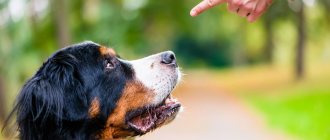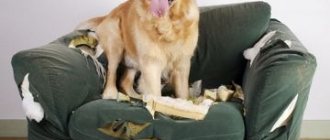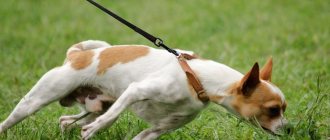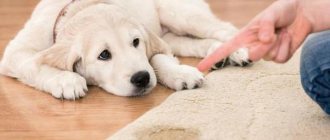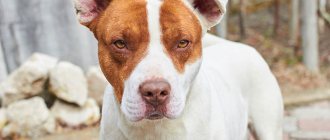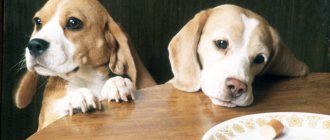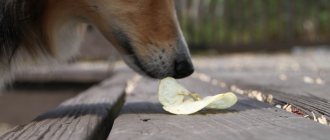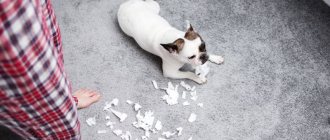Dirty or alien
A puppy may refuse to eat from a bowl if it smells foreign or simply unfamiliar and unpleasant odors. A typical situation: you washed the bowl using detergent, but you didn’t wash it well enough, which is why the dog smells chemicals and refuses to eat from such dishes.
There are cases when pets are very respectful and kind to other people's property and prefer to eat exclusively from their own bowl. In these cases, it will be enough to wash and rinse the bowl well in order to get rid of foreign odors.
Interesting: The most charming dog breeds - list, description, photos and videos
Isolation from the kitchen
The simplest and most effective method to rid your pet of the temptation to beg for a treat. It is extremely important not to feed the animal while eating. Allow yourself this once - the animal will make it a habit and will use its charm against you. Therefore, it is worth isolating the dog from the kitchen.
It is important to warn family members and guests to follow this rule. Thanks to this, the animal will develop a habit: you cannot be near the owner when he eats.
Fright
Fear is common in puppies. During puppyhood, the dog remembers any threat very well, and so well that it will be almost impossible to wean him from fear to a harmless bowl. Let's imagine a situation where you bought a new bowl with a stand, and a clumsy puppy knocked it over on itself, which caused a panicky fear of dishes.
The dog will not approach this stand, even if hunger takes over. The complexity of this case lies in the fact that you simply do not know and do not understand what exactly the dog is afraid of, since such an event could have happened without your presence or even with the previous owner. To solve the problem, you will need to buy a completely different bowl so that it differs from the previous one in all respects.
How to stop a dog from stealing food from the table?
If your pet still has the habit of begging for tasty treats, there is a chance that very soon he will start stealing food from the table. And if this has already happened, act immediately. What can you do to stop this bad habit in the bud? Thieves often activate when no one is around. Therefore, it makes no sense to punish the animal after the incident. The dog will no longer understand what is wrong and why the owner is swearing - he will simply forget.
Do the wiser thing: place a piece of treat on the edge of the table, and when the dog reaches for it, lightly slap him on the face. This should not cause pain, but rather become a distraction. If the dog only steals when you are not around, also place the treat on the edge of the table. But place plastic bottles or a scoop on top of it. Anything that won't break and cause serious injury to the animal. As soon as the pet decides to grab the goodies, a pile of objects will fall on him. This way the dog will develop an understanding that dragging from the table is painful and unpleasant.
Pet's spoiling
Far from being the least important reason would be arrogance. The pet is extremely demanding and is confident that you will feed it, in particular from your hands, and even better from the table, with harmful but tasty treats. Pampering is manifested in inviolability of the bowl and subsequent sitting and begging for food at the master's table. To solve this problem, it is enough to completely eliminate complementary feeding with all sorts of goodies. Leave the bowl of food for literally fifteen minutes; if you haven’t eaten it, then remove the bowl until the next meal.
Why does a dog eat quickly?
If you decide to teach your dog to eat correctly, then strictly follow the chosen tactics.
At first glance, it may seem that your pet does not have enough food and simply does not get enough to eat. Many animals are greedy for food, but if the dog lives in excellent conditions, has an established diet, and the food itself is balanced, then this type of feeding behavior is unlikely to develop.
Most often, the reason for the greedy absorption of food lies in the past of dogs that have lived for a long time on the street or in poor conditions: they have developed an instinct to fill their stomachs for future use. It is the instinct of survival that makes several puppies fight for their piece, taking it away from their brothers, and swallow it as quickly as possible. The reason for greed in food can also be untimely feeding of the animal. Whatever the reason, you need to find out how to stop your dog from swallowing food quickly and try all the methods.
Stress
Like people, dogs are subject to various stresses. They have a hard time experiencing loneliness, a change of place of residence or the loss of an owner. If there is stress in a pet’s life, it needs to be eliminated or the dog must be adapted to the factor that is bothering it. In particularly advanced cases, you will need to contact a specialist and further use of plant-based sedatives. In any case, it will take some time to adapt.
Interesting: How do dogs see? Do dogs see colors? Description, comparison with a person, photos and videos
Causes
If the causes of polyphagia are behavioral
, this may be caused by the aging of the animal. As you know, many older dogs are very voracious. It is also possible that some of the medications your dog is taking may increase his appetite.
Increased appetite can also be a consequence of diabetes
. When you have diabetes, the body cannot properly absorb sugar from the blood to nourish organs and tissues, which causes a constant feeling of hunger. Your dog may also have low blood sugar levels. A decrease in sugar levels is associated with insulin-producing tumors affecting the pancreas.
It is also possible that the dog has poor food digestion.
, developed as a result of a disease of the digestive system: inflammation of the intestines, gastritis or cancer of one of the digestive organs. Failure to properly metabolize food leads to weight loss and micronutrient deficiencies.
The pet takes food out of the bowl and eats it exclusively from the floor
This problem is quite common. The dog pulls out and scatters food, after which it smears it on the floor. Or he pulls out a piece and drags it to a secluded place. This behavior quickly gets boring for the owners, due to the need to constantly wipe and wash the floors. This pet behavior may be caused by the following reasons.
Instinct is from the earth, it is inherited: from generation to generation. You can’t argue with genetics, and in this case you should resort to chopping food, or seek help from a canine specialist.
The desire to eat the most delicious food first
The pet takes the pieces of meat out of the bowl and places them on the floor, thereby separating the different ingredients of the food. Dealing with this problem is quite easy, try cutting the meat into smaller pieces, then stirring thoroughly, the result will be noticeable immediately. If the dog chooses grains, try cooking the porridge until smooth.
Puppy is obsessed with food
Good afternoon
Our 3 month old Labrador is obsessed with food. I kept hoping that this was normal behavior for a Labrador, but after talking with the owner of another puppy from the same litter, I realized that this is not so. The puppy never feels full and asks to eat all day. I feed him super-premium dry food, give him a little more than the norm (the norm is 180 g per day, I give him 200 g), divide it into 5 meals. The puppy steals apples, onions, and tries to eat it all. When he sees me going to the refrigerator, he starts shaking and whining. When something is on the table, she jumps up and starts clinking her jaws in the air above it in order to grab something (I don’t know how else to describe it, but it looks amazing)). She spends her whole day waiting and searching for food, she’s not even interested in games, she can sit for several hours in front of the bedside table in which the food is stored and hypnotize her with her gaze). Recently she jumped up and grabbed a plastic container with salad from the table and began to frantically swallow it together with the packaging, I rushed to pull it out, and the puppy bit my finger very deeply in several places. Every time she eats as if she hasn’t eaten for a week, she shakes, swallows food in a few seconds, gags, although I never try to take the bowl away or put my hand in it. Once she started vomiting after eating wallpaper, I stood nearby and when the puppy vomited, she tried to eat it, I immediately took her away and cleaned up calmly. But the next time, when she began to vomit after eating a piece of wire, she clenched her jaw tightly and swallowed everything at once so that nothing would fall on the floor, apparently from greed.. Besides, she is slowly gaining weight, she looks quite thin, even compared to other puppies from the litter, who gain weight faster, but are much more relaxed about food. At 3 months weight 10 kg. So I'm worried, could this be due to hormonal imbalances? I consulted with several veterinarians, but everyone unanimously said that this is normal, it’s a Labrador. But I see this all day long and it doesn't look normal. The breeder advised us to do an experiment - give the puppy a full bowl of food and let him eat as much as he wants, when he has eaten his quota, he will go away on his own. But I didn’t do this, because she would never leave until she had eaten everything. Maybe someone's puppy also feels this way about food? Tell me how to behave. Could this be due to the monotony of the diet? Maybe you should switch to natural nutrition? Sorry for so many letters. Thank you! Modified on October 27, 2012 by NataliyaSaratov
Sources of the problem
Often the dog drags food out of the bowl.
Some animals eat from the floor or from hands, hiding food in corners. It's a debilitating problem when the floor is covered in dog food and there are scraps in the corners. The pet refuses the bowl because:
- The dishes are inconvenient;
- Bowl with foreign odor;
- Scared;
- Spoiled;
- Has memory at the genetic level;
- Wants to extract a tasty piece from the cup;
- Fears that food will be taken away;
- The diet is not varied;
- Changed food;
- Gets sick;
- Is capricious after illness;
- Is under stress;
- Not hungry.
The bowl may be uncomfortable for the dog and may not be the right size. It's worth trying a different dish. The size is chosen depending on the breed. Small dogs require stands.
Take the Attention Test! Find 10 differences! (click right here!)
Find the answer Are you bothered by some problem or question? Enter “Breed” or “Name of the problem” into the form, press Enter and you will find out everything about the issue that interests you.
The animal does not eat from the dishes due to foreign odors. A four-legged animal can also refuse water. For example, a cup smells like a chemical detergent. A dog can smell another animal that has eaten from a dish. Some dogs will not touch the cup if it has been touched by a stranger. Rinse the dishes.
Fright of an unknown object occurs in puppies. Don't buy bowls with stands. The puppy may drop the cup and get scared. The imprint will work. When the first acquaintance with the bowl is unsuccessful, the puppy will not approach it, even if he is hungry. Choose another dish that is different from the previous one.
The four-legged dog avoids dishes because it is picky. When the pet has studied the owner and knows that it will still get food. Your pet can come up to his cup, smell it and move away. This is how protest is expressed. The pet wants something tastier. The pet thinks that there is no need to eat dry food when the owner feeds him something tasty from his hand. Don’t pamper your dog with treats, teach him discipline.
At the genetic level, the animal has a memory - to take food from the ground. The dog pulls pieces out of the cup and eats from the floor. Instinct has a hereditary expression. If you feed your four-legged animal natural food, you will have to put up with it. Don't expect the bone and meat to be eaten neatly in a cup. You will have to clean the floor of dog food or feed the dog outside.
Animals eat selectively. The dog pulls out the meat so that it does not mix with the boiled cereal. The best piece is eaten first. Finely chop the meat and mix thoroughly with the porridge. Dry food can be soaked to a uniform consistency so that the dog does not pull out dry granules.
If there are several animals, dogs may hide food from each other. The instinct remains if the dog has previously been in an animal group. If there is no threat of competition for food, instinct will take its toll. The dog will take a piece from the cup and move it to another place to eat in peace. Give the food in a porridge form, stir the meat thoroughly. It will be inconvenient for the dog to hide food. Provide your dog with privacy; do not place bowls of neighboring animals nearby. Praise your pet when he eats from his own dish.
When a dog constantly receives the same food, it gets bored. The pet is able to refuse food. This is how dissatisfaction is expressed. If the dog is fed from the table, then the dog food will seem tasteless. Diversify your dog's diet and do not feed your pet human food.
The animal gets used to the type of food. Switching to another brand is not perceived by the dog. Or the new food is of poor quality, and the animal senses it. The owner does not notice the difference, and the four-legged animal denies the change of food with its behavior.
Due to poor health, the dog will not approach the plate of food, will eat from the hand so as not to offend the owner, or will refuse to eat. This behavior is caused by illness, stress, or a peculiarity of the digestive system. Loss of appetite is accompanied by fever, vomiting, diarrhea, and lethargy. The reason for refusing food is illness.
After an illness, the four-legged dog does not eat from a bowl because the owner gave him tastier food or fed him by hand. Owners, during an animal's illness, change their usual food. After the correction, the pet demands the same attitude, ignoring the bowl.
Dogs, like people, experience stress. This is affected by loneliness, longing for communication with the owner, a change of place and conditions of detention. Lost appetite. You will need to eliminate the stress factor or help your pet adapt. A specialist may prescribe sedatives. Gradually the pet adapts.
A healthy dog refuses to eat due to satiety. Complementary feeding replaced a full meal, hunger was removed by snacks. A spoiled animal begs for goodies, but does not touch the food. The owner will have to retrain the pet or constantly remove untouched portions.
Why doesn't the dog eat?
Is your dog hungry all the time? You just fed her and she's begging for food again? Does he lick the bowl for a long time? Why is this happening?
There can be many reasons for a pet’s “eternal hunger.” Let's list the most common ones.
- Organizational, behavioral
Analyze your pet's daily routine. Does it have enough sleep? How intense are the loads? What is the nutrition like?
If your pet walks and moves around too much, he may not get enough of the standard portion sizes. That's why he doesn't eat enough.
Determine your dog's daily energy needs. It depends on the size and age of the dog, on its temperament, the characteristics of a given life stage, the amount of exercise, weather conditions, etc. The food you choose and the daily volume of portions must meet this need.
- Meal schedule
In order for your dog to be well-fed and receive all the nutrients it needs, you need to follow a regular feeding schedule. Feed your dog at the same time every day. Follow the recommended feeding rate indicated on the specific food packaging. Make sure fresh water is always available.
- Feed/food quality
Make sure you are purchasing a quality product that is truly suitable for your pet.
A diet based on natural products must be agreed upon with a veterinarian. He will tell you exactly what and how often to feed the dog. If you choose ready-made food, give preference to super premium diets. The food should not contain low-quality ingredients, artificial flavors and flavoring additives - such diets awaken the appetite, but do not give a feeling of fullness.
High-quality complete food is easily digestible by your pet and he does not need to eat more portions to get enough food.
Please note that with natural feeding, the dog begins to want to eat faster. Such food is digested faster, “burns” faster - and the pet wants to eat again. High-quality dry food with a balanced content of proteins and carbohydrates is digested more slowly. The energy from the components of such food is released evenly and gradually, which means that the pet feels full longer.
- Diseases and helminths
The cause of a dog's eternal hunger can be diseases or infection with helminths. How long have you been on parasite prevention? Check your deworming schedule and visit your veterinarian to rule out any health problems.
If the problem is not due to the above reasons, the dog’s metabolism may be impaired. Be sure to show her to a veterinarian and check her internal organs and digestive organs.
Don't worry: in the early stages, most diseases are easy to stop, so it never hurts to be on the safe side.
When is it time to see a doctor
A dog can go without food for a couple of days, but it is better to try to immediately determine why it does not want to eat. If, in addition to loss of appetite, other symptoms appear, this is a reason to go to the doctor.
Alarming symptoms:
- elevated temperature,
- diarrhea or vomiting,
- discharge from the nose and eyes,
- stool disorders,
- lethargy and apathy,
- labored breathing,
- refusal of water,
- the dog is nervous when you touch it - most likely, something hurts.
No one knows your pet like you. If you notice changes in behavior, do not delay treatment and do not try to figure it out on your own; it is better to consult a doctor immediately.
If you need advice on dog nutrition, you can always ask your SUPERPET veterinarian.
Prevention
If polyphagia is the result of poor nutrition, regulate your dog's daily diet.
.
If this is the result of a malfunction in your dog's body, you will need to maintain contact with your veterinarian, have regular routine checkups, and make sure you have everything you need to properly care for your pet at home.
Have you recently fed your Shar Pei and he is already looking at you with hungry eyes? Do you give him more food than normal, but he still remains very thin and does not gain weight? Does your dog eat good super premium food, but still continue to go to the toilet 4 times a day?
My friends conducted a full examination of the dog, took blood biochemistry, a fecal digestibility test, and did an endoscopy, but they could not find the cause. No, the dog is not sick, she feels good, her fur is shiny and shiny, but she has an abnormally increased appetite, on the street she requires constant attention, as she is in search of food every second, and just like that, she will grab some nasty thing in her mouth. Shar Pei owners often come to us with questions: how to feed their pet; Is it worth giving more food than normal if the dog doesn’t eat enough? how to gain weight.


